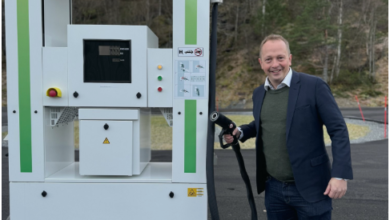Austrian companies sign up for using hydrogen in heavy vehicles

OMV (Austria oil and gas company) and Österreichische Post AG (Austrian transport and logistics service provider) today (24th February) have agreed to start utilising green hydrogen in heavy goods transport by 2023. They also aim for 2,000 fuel cell-powered heavy goods vehicles (HGVs) in Austria by 2030.
Their joint goal is to expand hydrogen-powered HGVs in Austria and helps promote their availability. OMV has been promoting green hydrogen and supporting the necessary infrastructure. Last week, it announced to invest with Kommunalkredit Austria for a 10 MW electrolysis unit at OMV Schwechat Refinery.
Thomas Gangl, OMV Chief Downstream Operations Officer, said that hydrogen is a key technology for CO2 reduction and for achieving climate targets. With the recent investment for the 10 MW electrolysis plant at the Schwechat site, we have laid the cornerstone for hydrogen mobility.
OMV previously told H2 Bulletin that in addition to using the green hydrogen in the refinery, we are also planning to set up an option for the green hydrogen in the heavy-duty segment (buses, trucks).
Österreichische plans to introduce test vehicles and integrate them into its existing logistics fleet. Both companies intend to use this to gain experience in operating the hydrogen supply chain and fleet. It operates the country’s largest electric-vehicle fleet, powered by solar energy which is generated from solar panels installed on its logistics facilities rooftops.
Peter Umundum, Member of the Management Board, Parcel & Logistics, Österreichische Post, said, with this partnership, we are taking an important first step towards introducing and proliferating electromobility with hydrogen fuel cells. Green hydrogen will be used exclusively for this purpose.
As a member of the EV100 initiative, Österreichische has committed to fully switch to electric vehicles or alternative fuel vehicles by 2030. The EV100 initiative was launched in 2017 by the Climate Group together with companies around the world committed to switching their fleets to electric vehicles and installing charging infrastructure for employees and customers by 2030.
